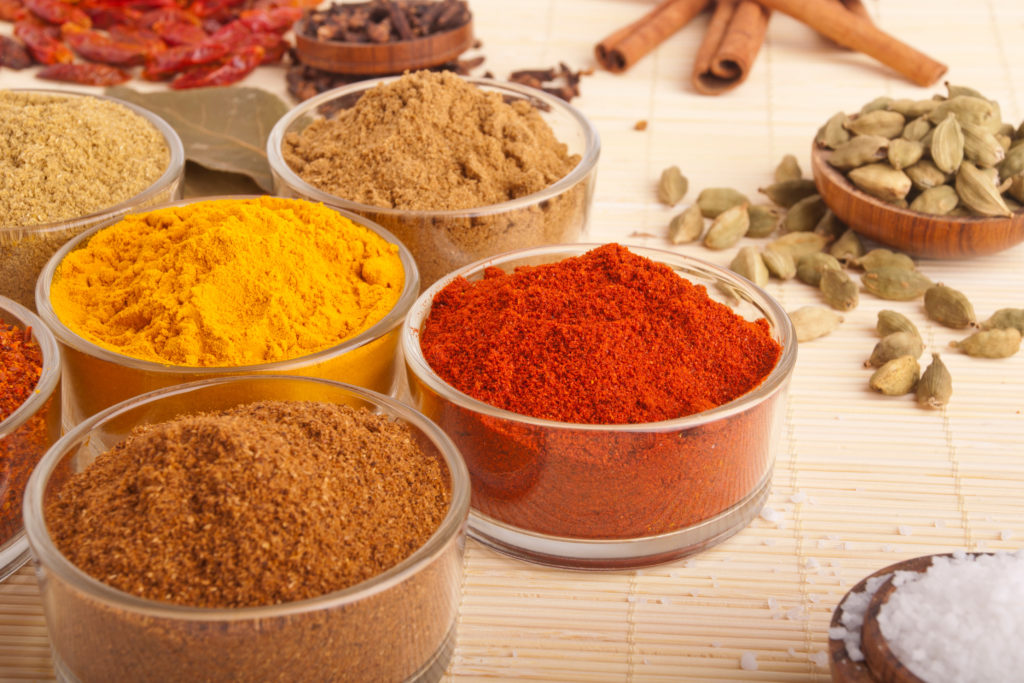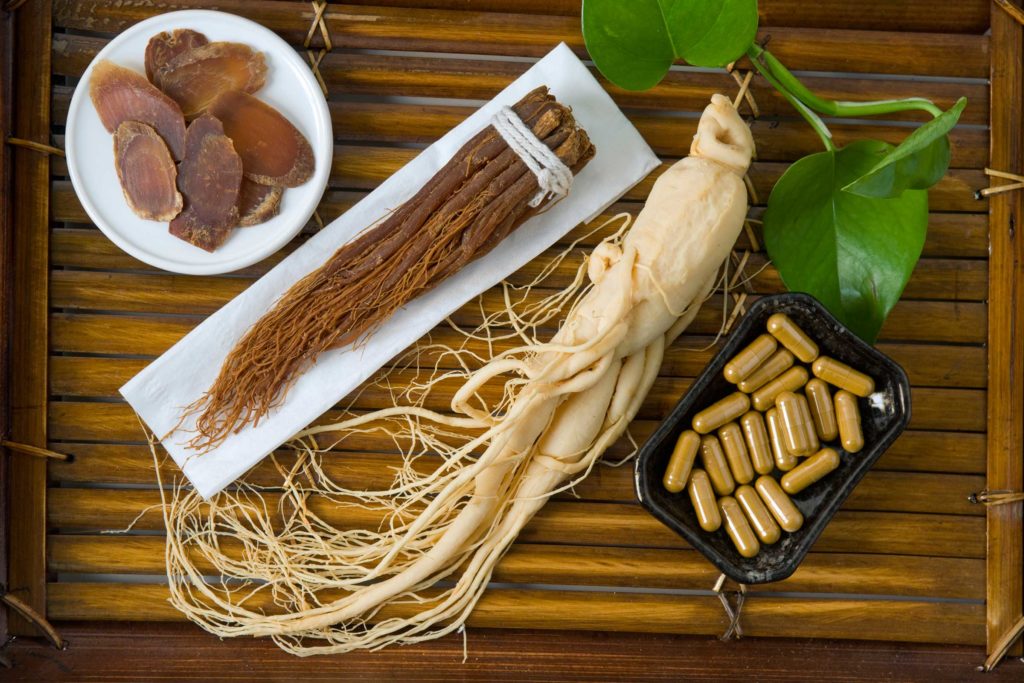Ginseng is the medicinal plant that has the highest reputation in Asia. Chinese physicians consider Asian ginseng, Panax Ginseng, as a tonic of Qi, the source of “vital energy.” They attribute to it the property of increasing the strength and volume of the “Blood” Vitality and appetite, to calm the “Spirit” and to procure wisdom. It is believed to act on the body as a whole in several subtle ways and contributes to a holistic approach to health and well-being.
Traditionally, Asian ginseng (P. ginseng) is said to be “white” when the root has simply been cleaned and dried. It is called “red” or “Korean red ginseng” when the root is steamed before being dried. According to practitioners of traditional Chinese medicine, Asian ginseng is “hot,” while American ginseng is more “cold.” It means, in short, that the Asian species is stimulating and nourishes your energy. The active molecules known to ginseng are the ginsenosides (of the saponin family). Many ginsenosides, identified to date and are present in different proportions in both species. Can a grass make you feel stronger and help you have a more sharp mind? Experts say yes: ginseng is the natural remedy that you need to increase your energy level and improve your concentration.
Ginseng Benefits: Doses
- Normalized extract (4% to 7% of ginsenosides). Take 100 mg to 200 mg twice daily for physical or intellectual fatigue, convalescence, stimulation of sexual function.
- Normalized extract (4% to 7% of ginsenosides). Take 200 mg, 1 to 3 times a day.
- Stain (1: 5 – g/ml). Take 5 ml to 10 ml daily.
- Dried root. Take 500 mg to 2 g roots as capsules or decoction (boil 1 g to 2 g roots in 150 ml water for 10 to 15 minutes). The dosages can be up to 3 g, three times a day.
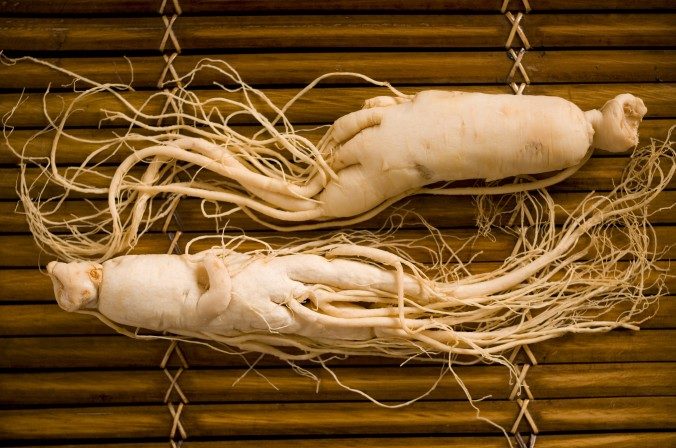
Ginseng Benefits: Diabetes
Although several studies indicate that each species of ginseng can help control blood sugar levels, dosages, and types of preparations have varied too much to establish a treatment protocol.
- Ginseng Benefits: Immune System Stimulation
Many trials in different animals indicate that ginseng can boost the immune system. The data are convincing in humans as well. In subjects vaccinated against influenza, standardized extracts of Asian ginseng (G115®, 100 mg, two times daily) 2 and American ginseng 3 (COLD-fX®, 200 mg twice daily) significantly reduced the risk to contract a respiratory infection compared to a placebo. One trial was conducted in Canada, with 270 people prone to the common cold. Taking a standardized American ginseng extract (COLD-fX®, 400 mg daily for four months) was more effective than the placebo in reducing the intensity and duration of symptoms. In addition, only 10% of people in the experimental group had more than one cold, compared to 23% in the placebo group. A smaller trial on the same product gave similar results to vaccinated elderly.
- Ginseng Benefits: Stimulation of cognitive functions
Commission E and the World Health Organization (WHO) recognize the use of Asian ginseng (Panax Ginseng) to re-establish the capacity for physical work and intellectual concentration. Although some clinical trials have yielded positive results, others have not been conclusive. The data does not allow us to conclude that Asian ginseng (or American) has any effect on memory, in particular, because of the poor methodological quality of the studies and the fact that doses And different types of preparations.
Two placebo-controlled trials published in 2010 indicated that taking a single dose of Asian or 17 Asian ginseng extract had a beneficial effect on short-term memory while inducing greater calm perception among participants. In one of these trials, treatment was continued for seven days: there was no improvement in these acute effects and no difference in mood or overall cognitive performance between the group Placebo and the treatment group. In two clinical trials, the efficacy of a mixture of Asian ginseng and ginkgo Biloba (Gincosan®) was tested to improve memory, with contradictory results.
- Ginseng Benefits: Improved physical performance
Again, clinical trials have yielded contradictory results. The majority, most notably the most recent, have not been conclusive. The author of a synthesis published in 2009 underlines that it is still waiting for a test done according to the rules of the art to demonstrate the effectiveness of the ginseng in the athletes wanting to improve their performances. More recently, a trial on amateur riders was inconclusive during an endurance test in hot, humid conditions: subjects had taken a single dose of a ginseng extract.
- Ginseng Benefits: Does ginseng improve memory?
Could ginseng help you have remarkable notes during a session exam or remind yourself of the names of your new clients at work? Studies suggest that yes. In a study by the University of Northumbria, the United Kingdom, people who had taken 400 milligrams of ginseng achieved conclusive results in terms of speed and accuracy in cognitive tests. These people have even become better when confronted with subtraction calculations, compared to pre-ginseng results. Interestingly, in a follow-up study, researchers found that higher doses of ginseng did not generate more effective reflexes, but they rather slowed reflection processes slightly.
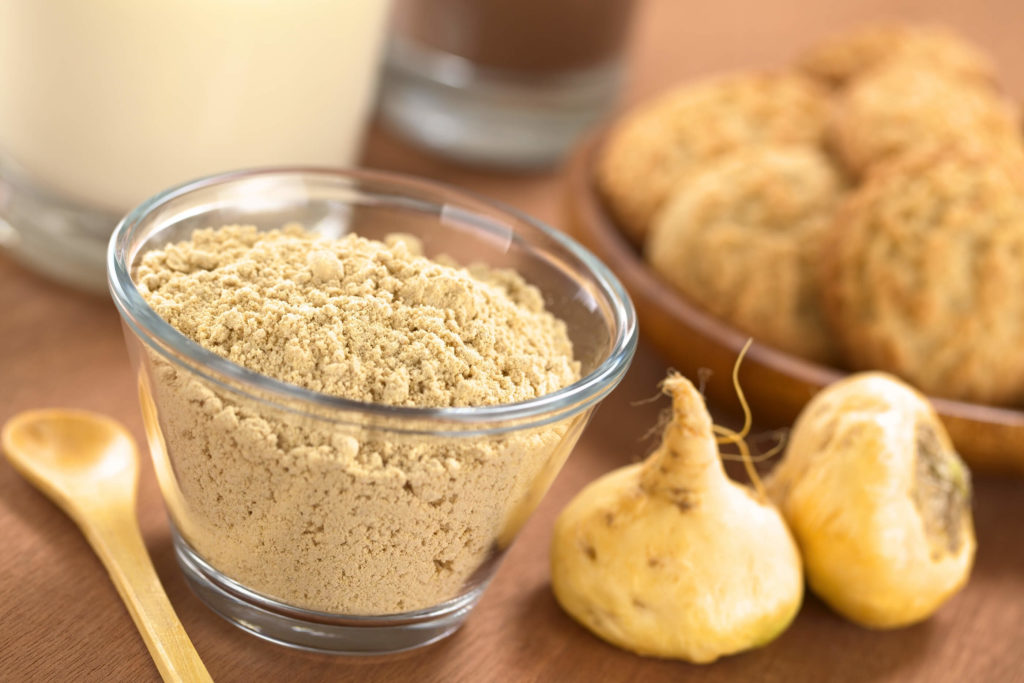
Ginseng Benefits: Ginseng is safe for whom?
Do not take ginseng if you are taking anticoagulants, heart medicines, such as digoxin, or antidepressants. People with diabetes should be aware that ginseng may reduce glucose levels in the blood. Ginseng may cause insomnia or anxiety. If either of them develops, stop using it immediately.
Ginseng Benefits: Precautions
- Warning
Self-medication for diabetes can cause serious problems. When treatment is initiated to alter blood glucose levels, blood glucose levels should be monitored closely. It is also necessary to tell your doctor so that he may, if necessary, review the dosage of conventional hypoglycaemic drugs. It is important to distinguish Asian and American species from ginseng because they have specific effects on each. Advisable to consult a naturopath, a duly certified herbalist, or a knowledgeable health professional to select the relevant species.
- Side effects
At the recommended dosages, ginseng is essentially devoid of adverse effects. An analysis of the adverse drug reaction data found in all clinical studies indicates that there were no more adverse effects in the treated subjects than in the control group. Note that in 1979, a study of 133 subjects taking Asian ginseng reported several adverse effects in 14 people: hypertension, nervousness, irritability, insomnia, diarrhea, etc. The author named this phenomenon ginseng abuse syndrome (GAS), but his study was discredited for lack of rigor, for among others, subjects who reported these adverse effects consumed huge quantities of ginseng (up to 15 g Day) and many also ingested a lot of caffeine.
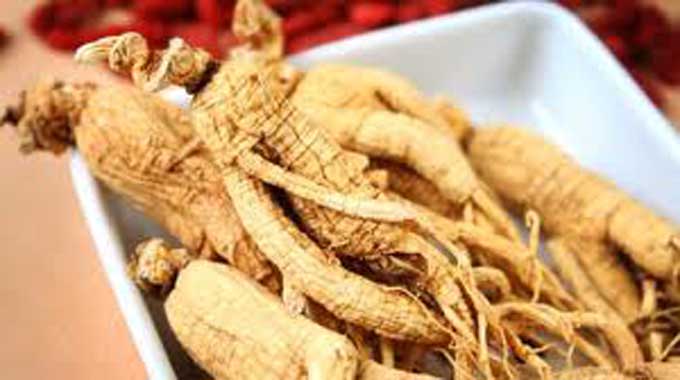
Ginseng Benefits: Contraindications
Commission E recommends avoiding Asian ginseng (P. ginseng) in cases of high blood pressure. Although it appears that the plant does not exert estrogenic action, some sources continue to recommend caution to patients with hormone-dependent cancer or whose risk of contracting this type of cancer is high. According to the authors of a recent synthesis, there is insufficient data to conclude that ginseng is safe for pregnant and lactating women. They, therefore, recommend caution.
Ginseng Benefits: On the shelves
The quality of ginseng supplements. From 1995 to 2000, analyzes revealed wide variability in the ginsenoside content of commercially available supplements, particularly in Sweden, France, the United States, and Ontario.
